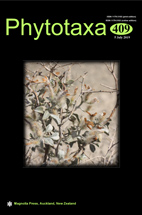Abstract
A new terrestrial coccoid cyanobacterial strain was isolated in depression of a rough concrete surface in village Zengkeng, Fujian Province, China. This strain, named CHAB 6571, was characterized by a polyphasic approach. The strain exhibited morphological similarity to the Aliterlella species but differed in its larger cell sizes and irregular arranged thylakoids. 16S rRNA gene sequences of the strain had the maximum homology as 94.13 % to the genus Aliterella. The phylogeny based on 16S rRNA gene sequences revealed that there were four separated coccoid cyanobacterial clusters formed in the position representing Chroococcidiopsidales, at the vicinity of Nostocales and away from other coccoid cyanobacterial orders such as Chroococcales, Pleurocapsales and Synechococcales. These four main clusters as the CHAB 6571 in cluster A, genus Aliterella of the family Aliterellaceae in cluster B, Chroococcidiopsis sensu stricto of Chroococcidiopsidaceae in cluster C, and genera Chroogloeocystis and Gloeocapsopsis in cluster D, were likely to represent four different families with their 16S rRNA gene sequences similarities as 90–94%. However, the 16S rRNA phylogenetic results also revealed that the Chroococcidiopsidales were not monophyletic since the organisms belonging to Oscillatoriales such as Cephalothrix, Aerosakkonema and Microseira were phylogenetically mixed into the Chroococcidiopsidales. Combining the morphological, ecological and molecular features, CHAB 6571 as a new genus and species, as well as a novel family were therefore established, named Sinocapsa zengkensis (Sinocapsaceae, incertae sedis).

